Nick Thomas-Symonds holds the venerable position of His Majesty’s Paymaster General, which, ironically as we shall see, was once in charge of the finances of the armed forces. His main responsibility in government, however, is as minister for the constitution and European Union relations, and it was that hat he wore this week to visit the European Commission in Brussels.
Thomas-Symonds is the man doing the hard yards to advance the government’s ‘reset’ of UK-EU relations and turn the warm rhetoric of the ‘Common Understanding’ agreed in May into tangible results. The parties have already concluded a Security and Defence Partnership, but the Common Understanding had an important proviso:
The truth is that the EU is just not that into us
The United Kingdom and the European Commission should swiftly explore any possibilities for mutually beneficial enhanced cooperation created by the Safe instrument, once adopted, in accordance with their respective legal frameworks.
Safe, or Security Action for Europe, is a financial instrument offering loans of up to €150 billion (£130 billion) to EU member states to invest in defence capabilities. When it was announced in March, the eligibility criteria were very carefully drawn up: the loans could be accessed by, and used for companies based in, EU member states, Norway and Ukraine, as well as third-party countries which had agreed security pacts with the EU.
It was inevitable at the time that some EU members, most obviously France, would seek to exclude Britain’s defence industry in order to maximise the advantage for their own sectors. If BAE Systems, Babcock and Rolls Royce were out of bounds, that would be all the better for Thales, Naval Group, Rheinmetall and KNDS. The alternative was for the UK to agree a security pact, almost at any cost. The Security and Defence Partnership was signed two months later.
It was not enough, and UK participation in Safe was subject to further negotiation. The potential conditions were likely to limit the spending with UK defence firms; again, EU members were, predictably, acting in their national economic interests. Thomas-Symonds has now decided that reaching a settlement is ‘urgent’:
We have the first round with the biggest projects coming up in November… and I make that point, not only because there is that particular process, but because of the urgency of the situation… in Ukraine. Ukraine doesn’t have much time to waste.
According to the Financial Times, the view from Brussels is that the UK will have to pay into the Safe scheme in proportion to the orders placed with British defence manufacturers. France has requested that no more than 50 per cent of the value of any procurement should be spent with UK companies.
Thomas-Symonds believes a deal can be reached quickly, referring to ‘a real shared sense of solidarity in defence across Europe’. His position, therefore, is that the matter is ‘urgent’ but we should not worry. It is fair to ask why the details of documents finalised in mid-May are only now being thrashed out four months later, as an important deadline looms.
It may stem partly from a fundamental miscalculation which has plagued the government since it took office in July last year. When the Cabinet Office minister Darren Jones gloated last year that the advent of a Labour government meant ‘the adults are back in the room’, he gave a perfect example of British exceptionalism. Sir Keir Starmer and his ministers seem consistently to have thought that the EU was waiting with bated breath for their arrival, eager to welcome a ‘grown-up’ Britain back to polite European society.
The truth is that the EU is just not that into us. Many members are still smarting from the affront of Brexit, and while most will welcome a closer relationship with the UK, they have other priorities. France is wrangling with a seemingly intractable budget crisis, Germany is witnessing the rise of a populist right-wing movement, the Netherlands has a caretaker government and members in Eastern Europe are acutely aware that Russia is their neighbour or near-neighbour.
It is now more than five and a half years since the UK left the European Union. Starmer’s negotiating stance veers between a slightly smug ‘Did you miss me?’ and complete capitulation to any demand the EU makes, but our partners have moved on.
Safe’s €150 billion is a tempting headline amount of potential expenditure. One EU diplomat described it as ‘an instrument to develop the European defence industry’, but it exists to develop the EU’s defence industry, a different proposition. It is created in the image of the Union itself: protectionist, high-walled, desperate to shield its own industry from competition. If the UK has to pay into Safe in proportion to orders received by UK companies, that starts to look very much like an elaborate subsidy system.
This was all predictable. Of course EU member states were going to act in their national interest, and of course they would seek to extract a substantial price for allowing us to participate. That is how Europe has always worked. How could ministers not see it? And now the clock is ticking.








Comments